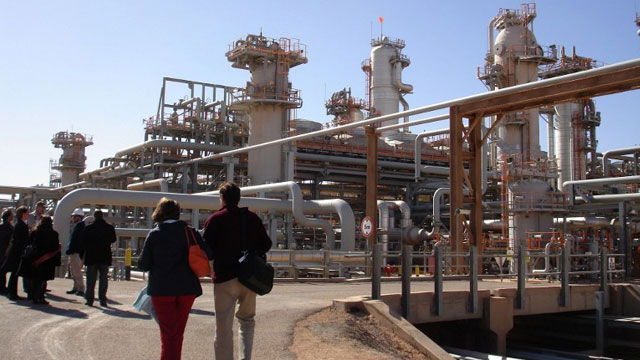SUMMARY
This is AI generated summarization, which may have errors. For context, always refer to the full article.

ALGIERS, Algeria – Foreign governments voiced growing alarm Thursday, January 17, over the safety of their citizens seized by Islamists at a gas plant in the Algerian desert, where a dramatic rescue operation left many hostages dead.
After a tense stand-off at the In Amenas plant that lasted all day and sent shockwaves across the world, Algerian troops ended their assault on the complex where hundreds of foreign and local workers were held, state media said.
The Algerian army controls just part of the natural gas complex, Algeria’s APS news agency reported.
Local officials in the southeastern region of Illizi had said the army’s raid was over late Thursday, but later clarified that only the residential area, where the majority of the hostages were being held, had been secured, saying the army was still surrounding the gas facility itself.
Communication Minister Mohamed Said said “several people” were killed or wounded and a “large number” of hostages freed at the site, jointly operated by British oil giant BP, Norway’s Statoil and state-run Algerian energy firm Sonatrach.
Earlier, the Al Qaeda-linked kidnappers claimed the army air and ground assault on the complex near the Libyan border had left 34 hostages dead.
Algeria’s Interior Minister Dahou Ould Kablia said the attackers had come from Libya, citing intelligence reports.
World powers expressed outrage and dismay.
British Prime Minister David Cameron, who cancelled a key speech to the European Union, citing the unfolding crisis, described a “very bad situation” at the compound, where a number of British citizens had been taken hostage.
“Already we know of one who has died. The Algerian armed forces have now attacked this compound. It is a very dangerous, very uncertain, a very fluid situation and I think we have to prepare ourselves for the possibility of bad news ahead,” Cameron said.
Act of retaliation
French President Francois Hollande said he was receiving regular updates on the “terrible” situation, which was strongly condemned by Japan.
In Washington, White House spokesman Jay Carney said: “We are certainly concerned about reports of loss of life. And are seeking clarity from the government of Algeria.”
Islamists raided the site on Wednesday in an attack which left two dead in retaliation for a French offensive against Islamists in neighboring Mali, demanding a halt to hostilities across the border.
Algerian media reports said nearly 600 Algerian workers and 4 foreigners — two from Britain, one from France and one from Kenya — were freed during the rescue operation. A total of 41 foreigners had been reported among the hostages.
The Irish government also said one of its citizens was freed, but Norway said it had no news of 9 of its nationals who worked at the plant
Japan’s Kyodo news agency reported that 14 Japanese hostages were still unaccounted for, citing engineering firm JGC.
The kidnappers told Mauritanian news agency ANI they would “kill all the hostages if the Algerian forces succeed in entering the complex.”
‘Mister Marlboro’
Veteran Islamist fighter Mokhtar Belmokhtar, a one-eyed Algerian jihadist with Al-Qaeda ties, has claimed responsibility for launching the attack.
Belmokhtar, dubbed “The Uncatchable” by French intelligence and “Mister Marlboro” for his illicit cigarette smuggling, was until recently one of the leaders of Al-Qaeda in the Islamic Maghreb (AQIM).
But he was pushed out of the organisation towards the end of last year and set up a group called “Signatories in Blood”. He has been blamed for previous abductions and the killings of both Algerians and foreigners.
The chief hostage taker on the ground, Abu al-Baraa, was reported killed in the Algerian operation by ANI, which often carries reliable reports from Al-Qaeda linked groups.
“We demand the Algerian army pull out from the area to allow negotiations,” Abu al-Baraa earlier told Al-Jazeera news channel.
But Algeria insisted it would not negotiate with “terrorists.”
The fast-moving hostage drama dragged Algiers and several top Western powers into the Mali conflict, taking the spotlight off French and government troops battling the Islamists controlling the country’s vast desert north.
The UN special envoy for the Sahel, Romano Prodi, said that the French air and ground intervention in Mali was the only way to stop Islamists creating “a terrorist safe haven in the heart of Africa.”
In Brussels, French Foreign Minister Laurent Fabius said EU countries may provide troops to help France in its former West African colony.
On Thursday, more French troops poured into Mali, boosting their number to 1,400, the defence minister said. At full strength the force will reach 2,500 soldiers.
Nearly 100 Nigerian and Togolese soldiers also arrived in Mali on Thursday as a first contingent from Chad made their way to the country for an African force set to reach over 5,000 troops.
A French defence ministry source said there were “clashes in several areas” in the conflict zone, but “no fighting in the area of Diabaly”, some 400 kilometres (250 miles) north of the capital Bamako, where the French troops engaged the Islamists on the ground a day earlier.
Islamist rebels who have controlled northern Mali since April pushed south into government-held territory last week and seized the town of Konna, about 700 kilometres by road from the capital, Bamako, prompting France to intervene. – Agence France-Presse
Add a comment
How does this make you feel?
There are no comments yet. Add your comment to start the conversation.